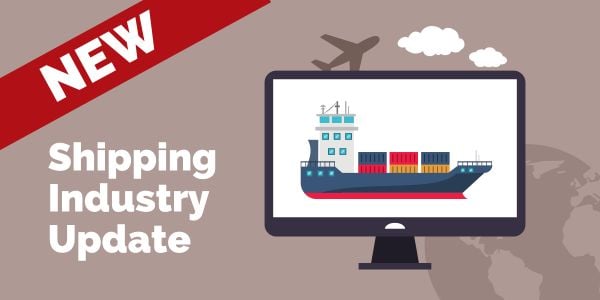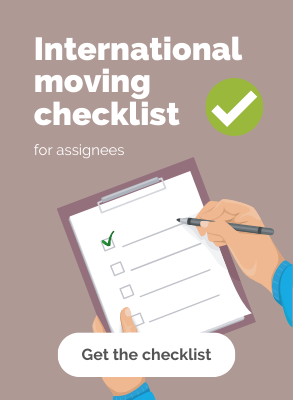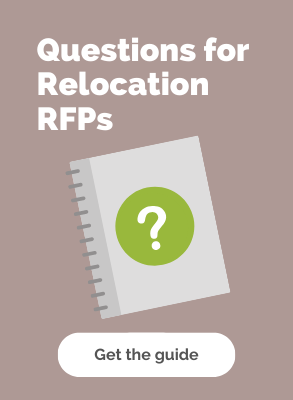
This monthly update, provided by the British Association of Removers gives a current overview of the global shipping market out of the UK. It provides HR and Global Mobility Managers with a useful and unbiased understanding of the potential challenges, cost implications and risks that may need to be planned for.
**Please note this information applies to all UK international removers and is not unique to Bournes.**
Key regional UPdates:
North America from Europe (USA, Canada, Mexico)
- The Trans-Atlantic shipping trade faces significant challenges due to reduced capacity by shipping lines. This imbalance, where customer demand exceeds available vessel space, has led to increased shipping rates, delays, and more frequent cancellations.
- Increase notice is likely to be required to secure vessel space and you should be prepared for possible delays outside of the mover's control if containers are 'bumped' to a later vessel or cancelled.
- Despite having negotiated annual freight contracts, BAR movers occasionally must accept new surcharges to secure their space allocations. For instance, Hapag Lloyd has announced a Peak Season Surcharge (PSS) for the transatlantic trade, effective from October 1, 2024. This will add $300 per 20-foot container and $400 per 40-foot container to freight costs.
- Potential strike actions by USA Longshoremen and Canadian Rail workers in October could cause severe delays and disruptions.
- There has recently been some noise about some airlines not accepting household goods shipments into the USA. We are aware that this is the case for American Airlines only at this stage, but believe this decision to be temporary and resolved soon. We will continue to keep our affected clients updated.
Eastbound from Europe (Asia, Oceania, India, Middle East)
- The Suez Canal diversion around the Cape of Good Hope due to conflict in the region is still working well. We do not have an estimate as to when it will be safe to return to normal routing so longer transit times should now be expected as the norm.
- The omission of Middle East calls on some shipping lines Europe > Asia services is putting increased pressure on services to the region with Middle East ports struggling with capacity and a backlog of shipments.
- BAR members are also seeing congestion in Transhipment ports in Asia.
- Increase notice is likely to be required to secure vessel space and you should be prepared for possible delays outside of the mover's control if containers are 'bumped' to a later vessel or cancelled.
Southbound from Europe (South, East, West Africa)
- No change.
- Where services are offered to this region they remain reliable.
- Some hinterland destinations served by overland transport from a main port have been removed from shipping line schedules, causing a reduction of the main destination port of call coverage across much of the region, particularly the Indian Ocean Islands.
Latin America from Europe
- No change.
- Where services are offered to this region they remain reliable.
- Some delays in the clearance and release of containers are exceeding free storage offered by shipping lines, which may result in accrued storage charges.
Changes to Costs
- Increased freight rates for export shipments from Asia is now impacting other routes as capacity reallocation has a knock-on effect on exports from Europe.
- Exchange rate fluctuations and shipping line fuel (bunkering) cost reviews can impact the final sea container freight cost. In some recent bunkering examples some movers have seen increases up to US$350.
Recent Developments
- The quality of containers has been an issue due to the additional containers needed to service Asia via the Cape of Good Hope. Movers have experienced increased frequency of instances where they have had to reject a container as unsuitable for transport of household goods, which can result in delays and additional haulage charges for a replacement.
- ONE LINE shipping company will no longer accept shipments for assignees holding Russian Passports. The BAR are monitoring the situation with alternative shipping lines carefully but it is important to notify your mover if your assignee is moving with a Russian Passport to allow them to assess the risk of delays or additional charges as a result of any disputes.
- The BAR have also recently received reports that some shippers are requiring fridge freezers to be declared as hazardous goods. We will provide further updates when clarification has been recieved from the shipping lines, in the meantime these will be handled on a case by case basis.
- There are no current strikes planned for UK ports, however we are closely monitoring threats of strike actions at a number of destination ports and will inform our clients of any potential delays on a case by case basis as the situation is very fluid.
Lithium-Ion Batteries
- Shipping lines are still yet to agree on consistent rules regarding the acceptance of Li-ION batteries which have been widely reported to increase risk of fire (examples include e-bikes/scooters, cordless power tools, laptops etc).
- The BAR Overseas group recommends that removable Li-ION batteries are NOT SHIPPED and are instead removed and replaced at destination. If they are included the shipment may need to be declared as Hazardous cargo which will require additional documentation processes and substantial freight surcharges, if permission is granted.
- Failure to declare batteries whether intentionally or in error is a serious offence under maritime law and could lead to substantial fines for the customer (approx US$30,000) and risk of confiscation/disposal of consignment.
KEY ACTIONS to MiNIMISE RISK
The combined impact of the above challenges on relocating employees can be summarised as follows:
- Longer lead times and increased notice may be required to secure vessel space.
- Increased likelihood of delays due to containers being rolled or rejected.
- Freight rate volatility still exists but is expected to settle in the coming months.
Recommended Actions for Global Mobility:
- Highlight any Russian Passport holders to your shipping provider to avoid complications with shipping lines.
- Plan in advance wherever possible, communicating moving dates early to allow sufficient time for booking vessels.
- Communicate closely with your shipping vendors to stay updated on changes in schedules, routes and capacity for your key lanes.
- Ensure transparency by making sure you or your mover are discussing potential delays with relocating employees to manage expectations.
- Consider updating your policy to address the challenges with Li-ION batteries to prevent complications and additional costs (or at least ensure your mover is communicating this clearly with employees). Discuss with your mover how to handle any exceptions, such as batteries which cannot be removed.
These actions can help minimise risk of additional costs or a poor service experience for your employees.
If you require any further detail or have questions please don't hesitate to contact our Corporate Relocation Team.








